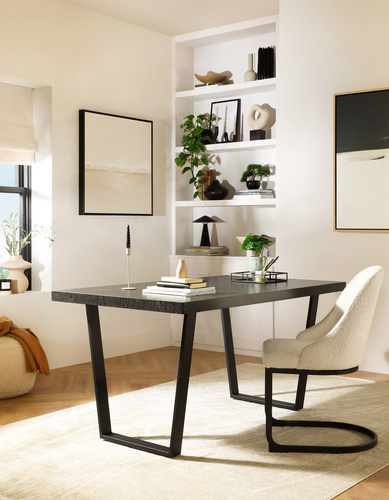6 expert feng shui tips: What it means for our wellbeing

The sofa is best with a solid wall behind it or just off of the centre of the room, but not under a window
Sarah McAllister - founder of Feng Shui Agency - shares with Furniture And Choice how feng shui brings a sense of wellbeing to your home.
Discover how this ancient philosophy is designed not only to improve your home layout but also put you at ease.
Expert tip 1: Keep the space free of clutter
“For the entrance way, keep it clear of clutter so that you don’t block the door opening fully, as this can cause the energy to stagnate,” Sarah says. “Keep the external and internal space brightly lit with an eco-friendly lightbulb, otherwise the area can become too dark and lifeless.”
However, Sarah says the space doesn’t have to be immaculate. “Don’t worry if there are signs of life at home - this is very healthy and perfectly normal unless you live in a show home!” she says. “The Chinese call these things “affection” - like a few toys here and there, maybe some clothes mending hanging around in a pile, or some unread magazines. It’s when things start gathering dust that you have a problem as the chi (energy) is stagnating.”
Expert tip 2: Arranging your furniture in the living room
When it comes to furniture arrangement in the living room, Sarah says, “Placing a TV or music system in the south east part of the room can be good but for this year it’s slightly problematic as we have some inauspicious energies in the south east that we aren’t keen on activating too much with loud music or sound and light. The sofa is best with a solid wall behind it or just off of the centre of the room, but not under a window.”
Expert tip 3: Add feng shui plants
“Tall upright plants with large round or smooth leaves or palm leaves are great for bringing natural energy into the space and for cleansing the air,” Sarah explains. “Ideally they are placed in plant pots which are up off of the floor, otherwise their uplifting impact is somewhat reduced. Avoid yucca plants or those palms with very sharp leaves – the parlour palms are fine though as these are a little pointed but softly so.”
Expert tip 4: Be in command in your home office
“Have a solid wall behind your desk so that you feel relaxed and in control of your space and ideally so you can see the entrance door,” Sarah says. “Having some sort of movement in the office is good particularly if you live on your own. This can be a water feature or an aquarium or one of those kinetic motion pieces of art. They do need precision placement as every home is different. Fresh flowers or those lovely moth orchids are also a great and easy way to bring natural energy into the space but don’t add them to a cluttered space, only when you have tidied up!”
“Contrary to popular thought, you don’t have to have a completely Zen space all the time. Sometimes we have a few days of high productivity where we need to spread out papers and drawings and get immersed in our internal creativity – in this state we don’t need everything perfect. But it is inadvisable to live and work like that all the time, since it gets too confusing, so I always have a nice tidy up after I have finished a working frenzy!”
Expert tip 5: Choose furniture with rounded edges
Curves are the way to go in the dining room as sharp corners are a big no-no in feng shui. “A circular or oval table in the dining room is considered more social than a rectangular one, but you can still bring warmth to the space even if you have a square table,” Sarah explains. “Adding candles creates warmth and appeals to the heart connection which then supports social rapport and also is helpful for digestion (earth element). A ‘lazy susan’ at the centre of the table is good fun as it requires some interaction with others in the space!”
Expert tip 6: Tips on mirror placement
Mirrors are more than just decorative items in feng shui; they are used to enhance the flow of positive energy. Strategically placed mirrors can enhance a room's positive energy. Hang the mirror on any wall in your dining room, as long as it faces the dining table. Avoid placing your mirror opposite a window. “Quite often there are fireplaces in a dining room and a common mistake is to put a large mirror above but the mirror is a water element, which causes a fire/water clash that can trigger arguments,” Sarah says. “Instead have a nice peaceful work of art above the hearth.”
For more feng shui tips, read our article: feng shui beginner's guide.
About Sarah McAllister:
Sarah McAllister is a classically trained feng shui master with over 25 years’ experience applying this intricate ancient wisdom to the modern built environment. She has worked on projects ranging from residential eco builds, luxury mansions to mixed use leisure developments, urban spas, boutique hotels and wellness resorts, as well helping people optimise their existing homes or office spaces.
Sarah is qualified in Environmental Psychology and served on the Wellness Architecture Initiative of the Global Wellness Institute.
Sarah has given talks for Oxford Brookes University, Futurebuild, RIBA, AIA, DECO, Homes for Good, Savills HQ and St Joost Design College and worked on six continents from Moscow to Tokyo, LA to London and in the Middle East.
www.fengshuiagency.com
https://www.linkedin.com/in/mastersarahmcallister
https://www.instagram.com/fengshuisarah/
ENDS
For more information or to contact our PR team, please email press@furniturechoice.co.uk or visit our Press Centre.
This press release was distributed by ResponseSource Press Release Wire on behalf of Furniture Choice in the following categories: Health, Home & Garden, Women's Interest & Beauty, for more information visit https://pressreleasewire.responsesource.com/about.